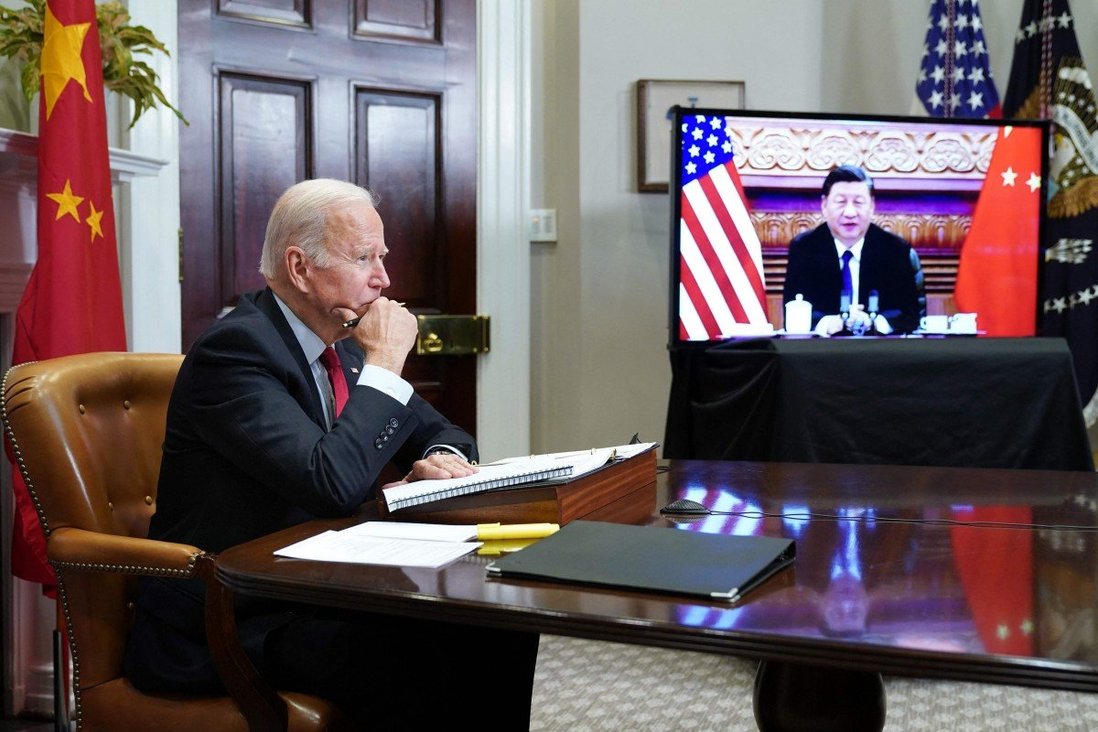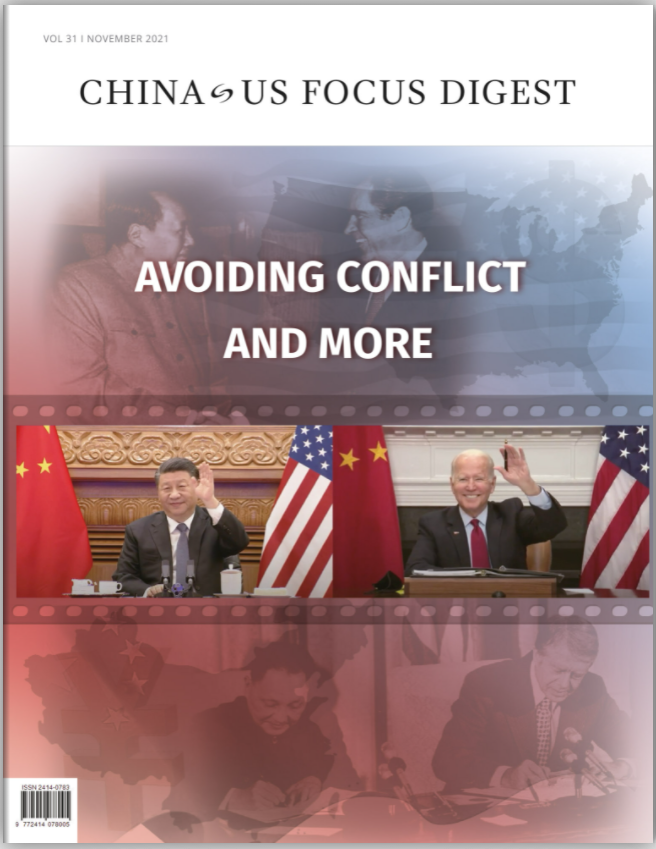
Chinese President Xi Jinping and President Joe Biden of the United States, met via videoconference for three and a half hours on Nov. 16.
The meeting, which went longer than planned, was part of an effort by the two leaders to manage tensions and explore ways the two countries can peacefully coexist. Xi called Biden “my old friend” and likened China and the U.S. to two giant ships sailing in the sea that must guarantee they don’t yaw, stall or collide head-on. Biden said competition between the two countries should be fair and healthy, and should not veer into conflict.
Undoubtedly, China-U.S. strategic competition will continue to unfold in the next 10 to 20 years, and the unusually complex and inevitably fierce major-country game will determine the fate of humanity in the 21st century. Xi put forward three principles for managing relations — mutual respect, peaceful co-existence and win-win cooperation. Not long ago, the Biden administration said that the U.S. doesn’t seek to wage a new cold war and the two countries need to achieve a “durable coexistence.” While China and the U.S. have been blaming and complaining about each other, as major nuclear powers they must accept the essential reality of coexistence.
If good foreign policy begins at home, it is certainly true in the handling of China-U.S. relations. There is actually a kind of empathetic understanding between Xi and Biden, as both strenuously yet resolutely push their respective ambitious domestic policy agendas.
Click here to read the latest issue of China-US Focus Digest
Just before the meeting, Biden signed the U.S. bipartisan infrastructure bill, which represents a small step in his campaign to rebuild the American middle class. U.S. Secretary of State Antony Blinken has highlighted “domestic renewal” a number of times in his speeches, which is also a goal China is trying to accomplish. Under Xi’s leadership, the CPC is going all-out to inaugurate a new cycle of national development. Creating better lives for 1.4 billion Chinese people is destined to be an extremely challenging task.
Xi stressed in his exchange with Biden that as the world’s two largest economies — and with both countries sitting as permanent members of the UN Security Council — China and the U.S. should increase communication and cooperation, each run their own domestic affairs well and shoulder their international responsibilities. He said the globe is big enough to accommodate the common development of both, and that both should adhere to a course of mutual benefits while avoiding a zero-sum game. To accomplish this, Xi said, it is important to clarify priorities.
First, he said, China and the U.S. need to deepen communication at all levels and in all fields, promoting communication and dialogue that can “solve specific problems.” Three main channels of communication have taken shape between China and the U.S.: diplomacy and security; trade and finance; economy; and climate change. How to allow these channels to play their due role will be a challenge for both parties.
Second, China and the U.S. should work together to provide more public benefits to the rest of the world — through leadership in the international community —to cope with outstanding challenges in such fields as public health and energy security. Xi said that all the global initiatives China has proposed are open to the U.S., and expressed hope that the U.S. will reciprocate. The two leaders engaged in-depth on such topics as Afghanistan, the Iran nuclear issue and the Korean Peninsula.
Third, the two parties should prevent bilateral ties from derailing and getting out of control. While Beijing and Washington both know that competition and conflict may not be mutually exclusive, reckless, high-intensity competition can escalate into conflict. Biden said the U.S. side doesn’t seek to change Chinese systems, doesn’t seek to confront China through strengthening alliances and has no intention of coming into conflict with China. Xi expressed hope that the U.S. will make good on its commitment to avoid a new cold war.
The Taiwan question was a highlight of the videoconference. It is also highly sensitive and could trigger a war between China and the U.S. Some people in the U.S. have been clamoring that Beijing will take military action against Taiwan by 2027, and have asked whether the U.S. will be able to “safeguard Taiwan” as the foremost issue in U.S.-China strategic wrangling. While the Chinese side feels the U.S. has begun playing the Taiwan card with greater malice as it has failed to win its trade war against China, even imagining that it can halt China’s peaceful rise via war.
The Biden administration seems to have arrived at the point of changing its long-standing policy of “strategic ambiguity” with regard to Taiwan. In a serious provocation of the mainland, Blinken openly proposed in late October allowing the Taiwan authorities to meaningfully participate at the UN system. Ahead of the Xi-Biden meeting, Blinken said the U.S. will “take action” should Taiwan be attacked. But in fact the notion of Taiwan independence poses a major problem for both China and the U.S. and is the root cause of instability in the Taiwan Strait.
Xi emphasized that the authorities in Taiwan have repeatedly agitated for independence, counting on U.S. backing, while some people in the U.S. make no secret of wanting to restrain Beijing over the island. This is a very dangerous tendency, like playing with fire, and whoever plays with fire gets burned.
Xi put it this way: “We have patience and are willing to strive for the prospect of peaceful reunification with utmost sincerity and utmost efforts, but China will be compelled to take resolute measures should the separatist forces for Taiwan independence make coercive provocations or cross the red line.”
Biden told Xi that the U.S. government is committed to a long-standing, consistent “one-China policy,” that it doesn’t support Taiwan independence and that it hopes peace and stability will be preserved. There is no doubt a dramatic difference between Beijing’s “one-China principle” and what the U.S. calls its “one-China policy.” But it’s in both countries’ long-term interests to guarantee they don’t come into intended or unintended conflict over the island.
The virtual meeting between the Chinese and U.S. leaders presented a precious opportunity for both sides to reaffirm bilateral ties with cool heads. Neither the idea of decoupling nor a new cold war conforms to the reality of China-U.S. relations. In the first eight months of this year, China-U.S. trade surpassed $470 billion — growth of 36.6 percent year-on-year. This is evidence that better lives for both the Chinese and American people are interdependent. Despite all the troubles in China-U.S. relations, the two sides should never give up the can-do spirit. As Xi said, the most important issue in international relations in the next 50 years is China and the U.S. finding a proper way to coexist.

